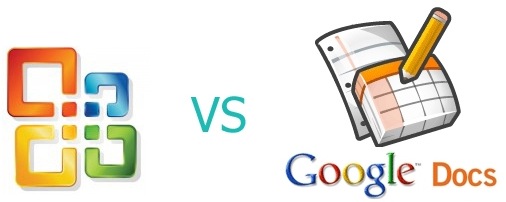For months now, we’ve been watching the back-and-forth as Google and Microsoft ramp up their respective Apps and Office productivity suites. Now, the drama intensifies. As Microsoft launches Office 2010 today, Google posted a blog entry that says that if users really want to upgrade, they’d complement their existing Office deployment with Google Docs. Here’s the scoop.
May 12, 2010

 For months now, we’ve been watching the back-and-forth as Google and Microsoft ramp up their respective Apps and Office productivity suites. Now, the drama intensifies. As Microsoft launches Office 2010 today, Google posted a blog entry that says that if users really want to upgrade, they’d complement their existing Office deployment with Google Docs. Here’s the scoop.
For months now, we’ve been watching the back-and-forth as Google and Microsoft ramp up their respective Apps and Office productivity suites. Now, the drama intensifies. As Microsoft launches Office 2010 today, Google posted a blog entry that says that if users really want to upgrade, they’d complement their existing Office deployment with Google Docs. Here’s the scoop.
Google’s blog entry opens with some fighting words for their rivals in Redmond:
“If you choose this path, upgrade means what it’s supposed to mean: effortless, affordable, and delivering a remarkable increase in employee productivity. This is a refreshing alternative to the expensive and laborious upgrades to which IT professionals have become accustomed.”
What Google is not-so-obliquely referring to is the $499 price tag on the boxed version of Microsoft Office Professional 2010 ($349 for a download), which some critics say is far too high to be reasonable. For comparison, an enterprise Google Apps license, which includes their SaaS document, presentation, spreadsheet and drawing applications, is $50/user/year and requires no servers and no additional infrastructure investment.
But is it really fair to compare a full-blown Microsoft Office Suite vs. Google Apps? No doubt, plenty of Global 2000 companies and even small businesses depend on Excel for intense, in-house financial applications. And many users we know simply aren’t willing to give up their desktop suites.
So how do the Microsoft and Google options stack up otherwise? One of Google’s major advantages over Microsoft in this arena has been their real-time collaboration functionality, but enterprises that license Office 2010 also receive the right to host Office Web — Microsoft’s stab at SaaS document creation and editing.
The caveat on Microsoft’s side is that on the web, Excel is the only Office application that allows for that kind of real-time collaboration. Word and PowerPoint will support it on the desktop, but in all three cases, SharePoint 2010 is required — and even then, the functionality looks to be fairly limited compared to Google Apps.
In response, Google’s blog points out that thanks to their DocVerse acquisition, users will soon be able to collaborate from within Office 2003/2007 as easily as from the Apps interface, and they’ll have all the cloud goodness besides, with no compromises on functionality.
So here’s the bottom line: Google makes a strong argument here for using Docs in addition to Microsoft Office and leaving the Office 2010 version by the wayside. But Office remains the de facto standard in the workplace, and I suspect a lot of VARs have had this upgrade planned since it was announced.
I’ll put the question to the audience, then: Does Google Apps have what it takes to compete with Microsoft Office 2010? Or has Microsoft already won?
Additional insights by Joe Panettieri. Sign up for The VAR Guy’s Newsletter; Webcasts and Resource Center; and via RSS; Facebook; Identi.ca; Twitter and VARtweet.
About the Author(s)
You May Also Like


